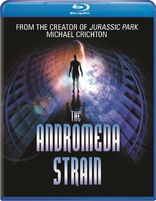The Andromeda Strain Blu-ray Movie
HomeThe Andromeda Strain Blu-ray Movie 
Universal Studios | 1971 | 131 min | Rated G | Feb 17, 2015Movie rating
7.3 | / 10 |
Blu-ray rating
| Users | 2.5 | |
| Reviewer | 3.0 | |
| Overall | 2.9 |
Overview
The Andromeda Strain (1971)
A team of scientists work feverishly in a secret laboratory to discover what has killed the citizens of a small town.
Starring: Arthur Hill (I), David Wayne, James Olson, Kate Reid, Paula KellyDirector: Robert Wise (I)
| Thriller | Insignificant |
| Sci-Fi | Insignificant |
| Mystery | Insignificant |
Specifications
Video
Video codec: MPEG-4 AVC
Video resolution: 1080p
Aspect ratio: 2.35:1
Original aspect ratio: 2.35:1
Audio
English: DTS-HD Master Audio 2.0 Mono (48kHz, 24-bit)
Subtitles
English SDH, French
Discs
50GB Blu-ray Disc
Single disc (1 BD)
Playback
Region free
Review
Rating summary
| Movie | 4.0 | |
| Video | 2.0 | |
| Audio | 3.5 | |
| Extras | 2.5 | |
| Overall | 3.0 |
The Andromeda Strain Blu-ray Movie Review
In the Old Days, Killer Germs Came from Space
Reviewed by Michael Reuben February 21, 2015How did The Andromeda Strain ever get a G rating? Leave aside the fact that one of the dead bodies in the New Mexico town infected with an unknown space "bug" is a young woman shown topless and fully exposed. The sight of all those bodies lying in various unsettling poses is so macabre and disturbing that it scared the hell out of me when the film first appeared in 1971. It's still unsettling now, even though the Seventies technology is hopelessly outdated, the state of medical knowledge has advanced considerably since then, and the working partnership between science and government portrayed in the film is, to put it mildly, quaint. Credit the sure hand of the late Robert Wise, whose directorial expertise ranged from sci-fi (The Day the Earth Stood Still) to musicals (The Sound of Music), and who also knew a thing or two about editing (having cut Citizen Kane, among others). Andromeda may be old, but there's nothing dated about its craftsmanship. The Andromeda Strain was the first bestseller published by author Michael Crichton under his own name. Until then, for reasons he describes in the "Portrait" included in the extras, Crichton had written under pseudonyms, but after Andromeda he was well on his way to becoming the brand that would help propel such successful works as Coma, Jurassic Park, Congo and Disclosure, all of which would be adapted into successful films. But it all started with Andromeda, which Wise went out of his way to cast without stars and to direct in an apparently matter-of-fact, documentary style that contrasted sharply with the huge stakes at issue. The film even opens with a title card suggesting that it recounts true events, just as Crichton's book pretended to recount "history" and included a fake bibliography of scientific sources.
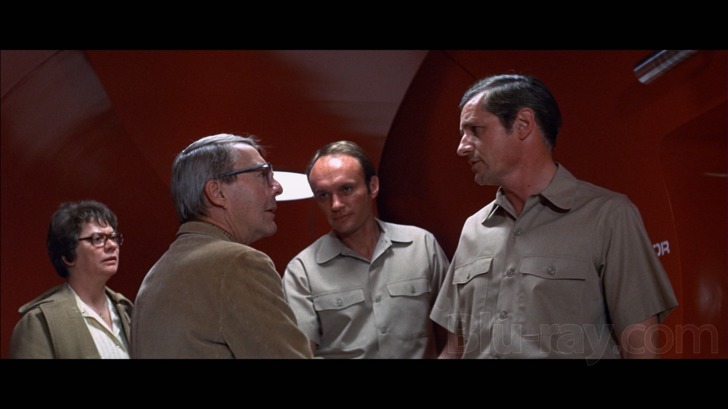
Andromeda chronicles a few intense days of crisis after a satellite sent into space by a secret project known as SCOOP returns to earth in the remote New Mexico town of Piedmont. When everyone in town (with two notable exceptions), plus the military team sent to retrieve the satellite, dies within seconds of exposure to whatever the satellite brought back, a protocol is triggered known as a Wildfire Alert. The satellite is retrieved and isolated in a secret underground facility, where a team of scientific experts analyze it using what was then state-of-the art computer and medical technology. The task is to identify the alien pathogen and develop a cure. What distinguishes Andromeda from so many science fiction films is that, until the last ten minutes or so (during which, the film's trailer warns, no one will be seated!), the film is almost entirely exposition. It isn't as if the Wildfire team is fighting an enemy that tosses around jeeps and gulps down its prey, like the dinosaurs of Jurassic Park. The adversary in Andromeda is microscopic, and the film consists of scientists and doctors talking, debating, arguing, running tests and experiments, working giant remote arms behind hermetically sealed glass panels, studying readouts on antique monitors and printouts from teletypes. The dialogue by Nelson Gidding (The Haunting) is sharp enough, and the cast—Arthur Hill, James Olson, Kate Reid and David Wayne—are skilled enough to make the material play like it matters, even though the film is too long by contemporary standards. Audiences in the early Seventies may have needed the education about how to decontaminate the human body provided by the lengthy sequence of the Wildfire team's preparation, but modern viewers have lived through enough hospital-borne infections, epidemic scares and sexually-transmitted diseases to grasp the problem instinctively. Wise was a master of editing rhythms and odd camera angles, and he knew how to use both to infuse tension into scenes that, in other hands, might appear routine. One of his favorite devices, the "split diopter" shot, occurs so frequently in Andromeda that your eye almost comes to expect it. The split diopter cleaves the anamorphic Cinemascope frame into several parts (usually two halves), each with a different lens; the divide is concealed in a vertical line somewhere in the scene. One side focuses on a distant object, while the other focuses on something nearby. An interesting example occurs early in the film when a military escort arrives to take Dr. Jeremy Stone (Hill) to the Wildfire facility; Wise splits the screen into three parts, with one senior officer in closeup at either side and the center occupied by two armed soldiers waiting in the car. The effect is unsettling, as the camera emphasizes the firepower backing up the two polite but insistent men at Dr. Stone's door. The ultimate threat in Andromeda is that the space organism will escape its containment at the Wildfire facility and threaten an unstoppable epidemic that ravages the planet. As the doomsday safeguard against such a contingency, the lab is equipped with a nuclear self-destruct device that can only be deactivated by the team's designated "odd man", Dr. Mark Hall (Olson). When a film lays out such an elaborate mechanism in detail near the beginning, it is inevitable that the deadly device will be triggered near the end, and the race to stop it serves as Andromeda's sole action sequence, as well as its conclusion. Leaving aside some minor detours into paranoia about government research in biological warfare (which would fully flower several decades later in Outbreak), Andromeda depicts a world in which, for the most part, science and the military work in harmony. Threats come from the vast, uncharted regions of unknown phenomena out there. As Crichton's work progressed, he would focus more and more on dangers we create for ourselves.
The Andromeda Strain Blu-ray Movie, Video Quality 
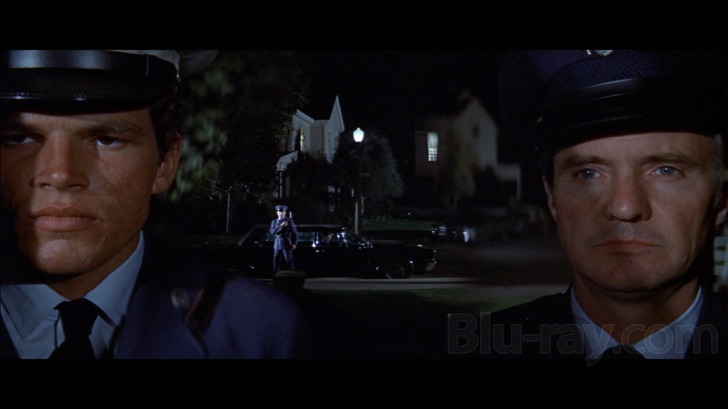
The Andromeda Strain was shot by Richard H. Kline, who would reteam with Wise on Star Trek: The Motion Picture and also shot The Fury for Brian De Palma. Considering how long it's taken to get the film on Blu-ray, and how difficult it's been to find copies since Universal Home Video decided to release the disc as a Best Buy exclusive, I wish I could report that this 1080p, AVC-encoded Blu-ray offered a good presentation of the film, but I can't. This is clearly an old transfer, probably dating back to Universal's 2003 DVD release, if not before. The source material is less than pristine, with a nearly constant parade of small white specks and marks, and the image betrays the shifting and instability known as "telecine wobble" that is wholly absent from contemporary transfers using the best equipment. It's not so severe as to render the film unwatchable, but a new transfer wouldn't have it at all. The colors are generally very good (and Andromeda is a film that uses color in a distinctive and memorable way), but the image is soft and the grain pattern is often indistinct. This is only to be expected in shots involving opticals and other special effects, including Wise's innovative use of split-screen, but the indistinctness infects the entire film. A new transfer from either the original camera negative or even a good quality interpositive would have superior detail and better densities. Universal has mastered Andromeda on a BD-50 with a high average bitrate of 32.98 Mbps, but all the bits in the world can't compensate for a weak and dated transfer.
The Andromeda Strain Blu-ray Movie, Audio Quality 
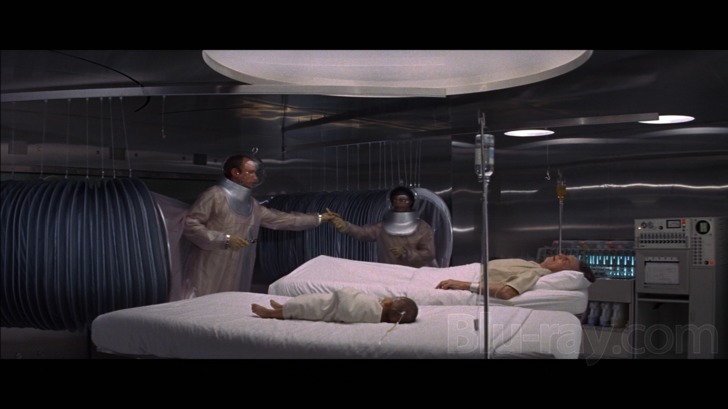
The Andromeda Strain was released in mono in America, and although there was reportedly a six-track mix prepared for 70mm release in Europe and Australia, the mono mix has always been the standard track on U.S. home video. It is included here in lossless DTS-HD MA 2.0, and it sounds very good, albeit dated in its approach. Like the scientific apparatus they were created to accompany, the sound effects have an assertively electronic quality that once was considered the epitome of hi-tech, but (at least for me) that's part of their charm. The Wildfire facility is a constant barrage of mechanical and electronic sounds, accompanied by endless announcements of techno-babble over the P.A. system (nearly all of it invented, as screenwriter Gidding happily admitted). Alarms and alerts are plentiful, and human voices are often in danger of disappearing in the cacophony. For the most part, though, the dialogue is intelligible, the sole exception being the elderly survivor from Piedmont named Jackson (George Mitchell), who has always been hard to understand. The synth score is by Gil Melle (The Sentinel).
The Andromeda Strain Blu-ray Movie, Special Features and Extras 
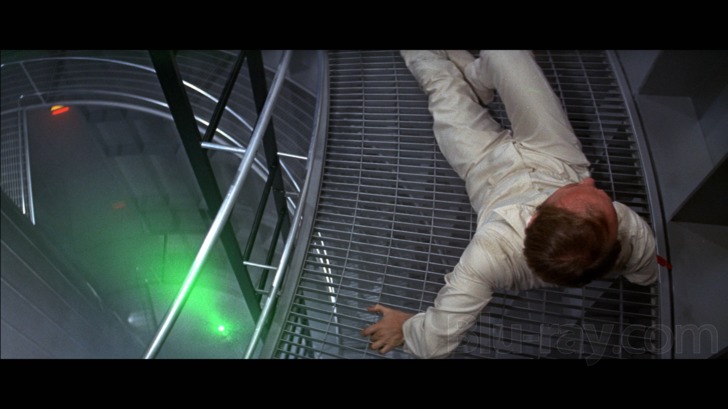
In the early days of DVD, Universal licensed The Andromeda Strain to Image Entertainment for a featureless release in 1998. Then, in 2003 Universal reclaimed the title for its own release with some new special features, which have been ported over to this Blu-ray, along with the dated transfer:
- The Andromeda Strain: Making the Film (480i; 1.33:1; 30:08): Wise, Gidding and Crichton and special effects legend Douglas Trumbull are the main contributors to this informative documentary on the making of Andromeda, which describes how the project came to Wise's attention and its transition from page to screen. Several key issues are addressed, including the decision to change Kate Reid's character from a man (in the novel) to a woman (in the film).
- A Portrait of Michael Crichton (480i; 1.33:1; 12:34): This brief overview of Crichton's early career looks at his years in medical school and his early books published under various pseudonyms, followed by his unexpected breakthrough with Andromeda.
- Theatrical Trailer (480i; 1.85:1; 3:18): The trailer is an effective effort at making the film look far more action-oriented than it really is.
The Andromeda Strain Blu-ray Movie, Overall Score and Recommendation 
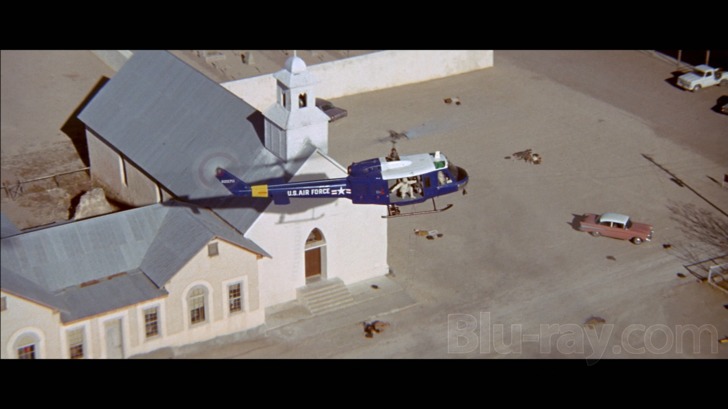
Steven Soderbergh's Contagion is an apt depiction of contemporary concerns about an epidemic and the scientific community's likely reaction, and it's appropriate that the killer bug in Soderbergh's film is a mutated virus that "jumps" to humans from an animal. The Andromeda Strain belongs to an earlier era, when space exploration remained an active national pursuit and the risk of bringing back something dangerous posed a credible threat. As long as one is willing to suspend disbelief, the film can still transport the viewer back to that time and mindset. Unfortunately, because of Universal's cheapness, one must also suspend one's expectation for a decent Blu-ray. Recommended only if the price is rock bottom.
Similar titles
Similar titles you might also like

Arrival 4K
2016

Colossus: The Forbin Project
1970

Battle of the Worlds
Il pianeta degli uomini spenti / Planet of the Lifeless Men
1961

2010: The Year We Make Contact
1984

Brainstorm
1983

The Signal
2014

Contact
1997

Ejecta
2014

The Invaders: The Complete Series
1967-1968

The Day the Earth Stood Still
Special Edition
1951

The Invasion
2007

The Day the Earth Stood Still
2008

The Salamander
1981

Phase IV 4K
1974

Sleep Dealer
2008

The Machine
2013

Air
2015

The Arrival
1996

Annihilation 4K
2018

Buried
2010
